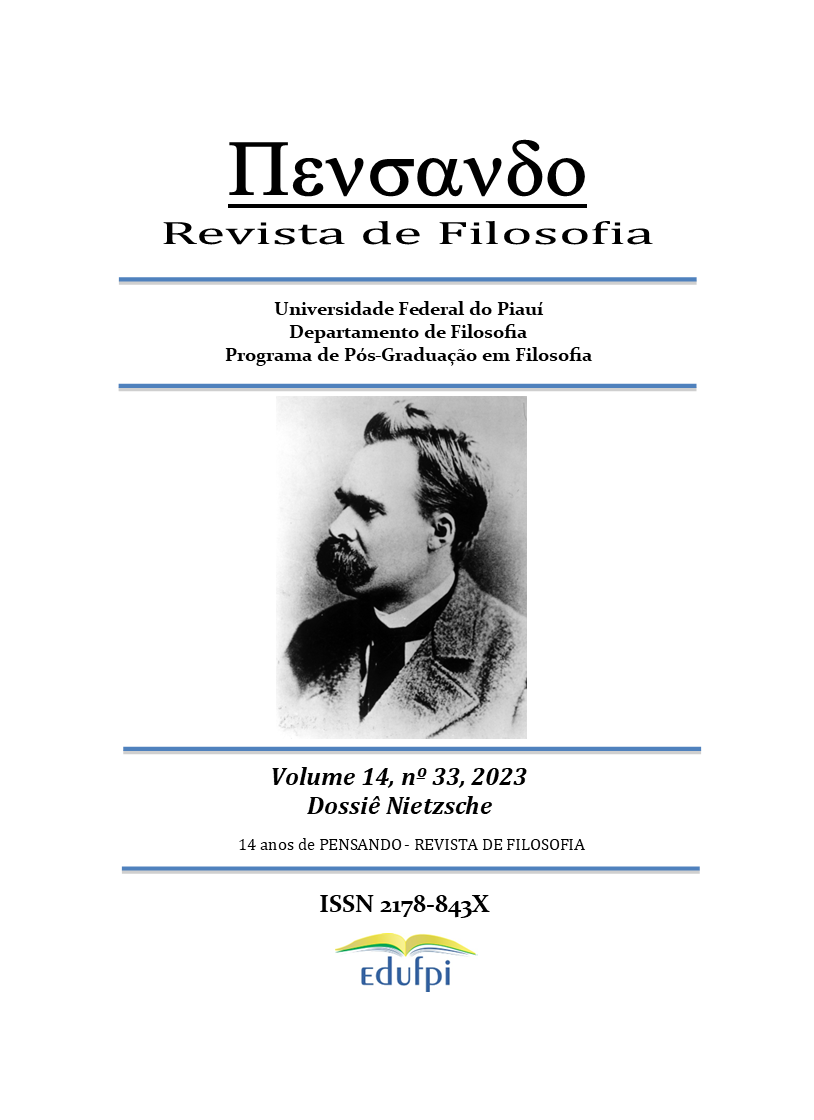In the Zone
metáfora e percepção imaginativa na lida habilidosa
DOI:
https://doi.org/10.26694/pensando.vol14i33.4230Palabras clave:
Metáfora, Enactivismo, Ver-comoResumen
Em artigos recentes, Shaun Gallagher e colaboradores estabeleceram uma abordagem segundo a qual metáforas enativas diferem de metáforas linguísticas ao integrarem um know-how habitual, não representacional, que pode ser caracterizado nas bases do ver-como (seeing-as). No presente trabalho, eu examino a contribuição dessa abordagem não apenas para uma teoria contemporânea da metáfora, mas também para a elucidação dos modos de atuação de metáforas na lida habilidosa. Minha posição é de que o modelo não dá conta de situações em que a excelência da ação exija habilidades de ajuste e de transformação online dos modos de percepção e do acoplamento com o ambiente. Buscando uma via alternativa, proponho um modelo de percepção imaginativa que comporte a atuação online de esquemas e imagens mentais nas bases da abordagem simulacionista e multimodal de conceitualização desenvolvida por Lawrence Barsalou.
Citas
ARISTÓTELES. Poetics. IN: HALLIWELL, Stephen(ed.). The Loeb Classical Library. Cambridge: Harvard University Press, 2000.
BARSALOU, Lawrence. “Perceptual symbol systems”. In: Behavioral and Brain Sciences, v. 22, 1999, pp. 577–609.
______. “Ad Hoc Categories”. In: Memory & Cognition, v.11, n.3, 1983, pp. 211-227.
______. “Situated conceptualization”. In: COHEN, H.C.; LEFEBVRE, C. (ed.) Handbook of Categorization in Cognitive Science. Amsterdam: Elsevier, 2005, p. 619-636.
CLARK, Andy. “Embodied Prediction”. In: METZINGER, Thomas.; WINDT, Jennifer. M.(Eds). Open MIND: 7(T). Frankfurt am Main: MIND, 2015, pp. 1-21.
DI PAOLO, Ezequiel; CUFFARI, Elena.; DE JAEGHER, Hanne., Linguistic Bodies: The Continuity Between Life and Language. Cambridge: MIT Press, 2018.
GALLAGHER, Shaun. Enactivist Interventions: Rethinking the Mind. Oxford: Oxford University Press, 2017.
______. “Are Minimal Representations Still Representations?”. In: International Journal of Philosophical Studies. 16:3, 2008, pp.351-369.
GALLAGHER, Shaun.; LINDGREN, Robb. “Enactive Metaphors: Learning Through Full-Body Engagement”. In: Educational Psychology Review, v. 27, 2015, pp. 391-404.
GALLAGHER, Shaun.; RUCINSKA, Zuzanna.; FONDELLI, Thomas. “Embodied Imagination and Metaphor Use in Autism Spectrum Disorder”. In: Healthcare, v.9, n.200, 2021.
HEMINGWAY, Ernst. The Old Man and the Sea. New York: Scribner, 2003.
HUTTO, Daniel.; MYIN, Eric. Evolving Enactivism: Basic Minds Meet Content. Cambridge: MIT Press, 2017.
LAKOFF, George; JOHNSON, Mark. Metaphors We Live By. Chicago: The University of Chicago Press, 2003.
KÖVECSES, Zoltan. Where Metaphors Come From: reconsidering context in metaphor. New York: Oxford University Press, 2015.
LINS DO REGO, José. Riacho Doce. São Paulo: Global Editora, 2021.
MERLEAU-PONTY, Maurice. Fenomenologia da Percepção. São Paulo: Editora WMF Martins Fontes, 2018.
MONTEIRO, Barbara; TONER, John.; MORAN, Aidan. “Considering the role of cognitive control in expert performance”. In: Phenomenology and the Cognitive Sciences, 14 (4), 2014, p. 1127–1144.
MONTERO. Barbara. Thought in Action Expertise and the Conscious Mind. Oxford: Oxford University Press, 2016.
NOË, Alva. Action in Perception. Cambridge: The MIT Press, 2006.
_____. “Concept Pluralism, Direct Perception, and the Fragility of Presence”. In: METZINGER, Thomas; WINDT, Jennifer (Eds). Open MIND: 27(T). Frankfurt am Main: MIND, 2015.
RITCHIE, David. Context and Connection in Metaphor. New York: Palgrave Macmillan, 2006.
RYAN JR., Kevin; GALLAGHER, Shaun. “Between Ecological Psychology and Enactivism: Is There Resonance?”. In: Frontiers in Psychology, v.11: 1147, (june) 2020.
SEARLE, John. “Metaphor”. In: JOHNSON, Mark (Ed.). Philosophical Perspectives on Metaphor. Minneapolis: University of Minnesota Press, 2011.
SUTTON, John; McLLWAIN, Doris; CHRISTENSEN, Wayne; GEEVES, Andrew. “Applying intelligence to the reflexes: embodied skills and habits between Dreyfus and Descartes”. In: Journal of the British Society for Phenomenology, 42, 2011, pp.78–103.
WITTGENSTEIN, Ludwig. Remarks on Philosophy of Psychology. G.E.M. Anscombe e G.H. von Wright (Eds.). Trad. G.E.M. Anscombe. Oxford: Basil Blackwell, 1980.
_______. Tractatus Logico-Philosophicus; Tagebücher 1914-1916; Philosophische Untersuchungen. Frankfurt am Main: Suhrkamp, (Suhrkamp Taschenbuch wissenschaft, v.501), 2006.
Publicado
Cómo citar
Número
Sección
Licencia
Derechos de autor 2023 PENSANDO - REVISTA DE FILOSOFIA

Esta obra está bajo una licencia internacional Creative Commons Atribución 4.0.

























